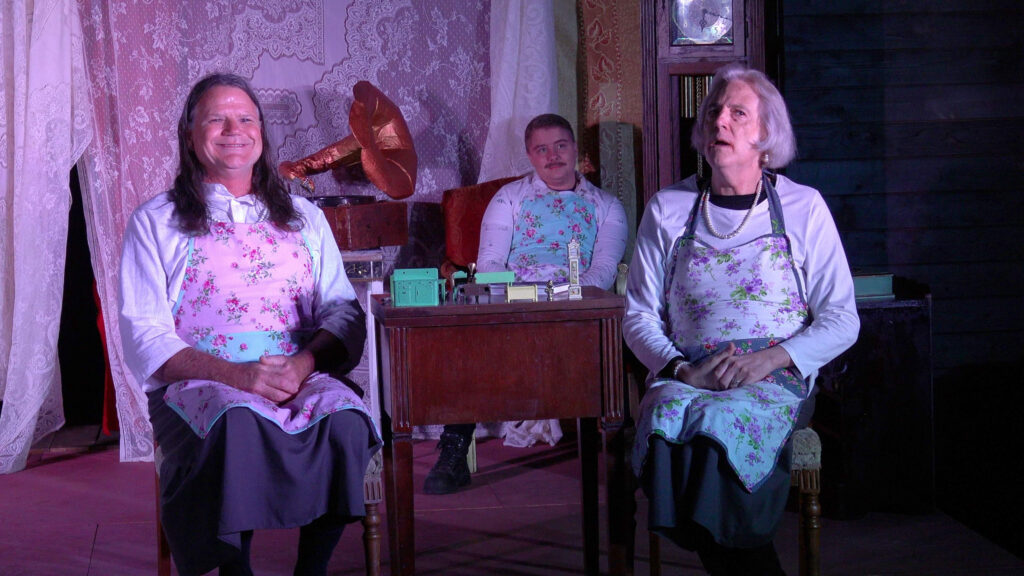
At the start of rehearsal on a rainy February afternoon, the director of the play “I Am My Own Wife” is on the hunt for a very important prop.
“My birth certificate and my vaccination paperwork were just old looking enough that that’s the props we’re using,” says director Dashboard Schweizer. “Right now, it looks like we may have lost one of those props. I knew I was taking a chance using my birth certificate for this production, but I think we’ll find it.”
Schweizer is right; before the full cast arrives, they find their birth certificate in the pocket of an apron. Every member of the cast wears one — pink and purple aprons with alternating floral patterns. It’s an homage to Charlotte von Mahlsdorf, a prominent antiquarian and transgender woman who lived through two of Germany’s strictest regimes.
Doug Wright wrote “I Am My Own Wife” as he tried to make sense of Charlotte’s life and legacy through a series of interviews. Schweizer’s theatre troupe is going on the road to perform the play at Nashville’s Darkhorse Theatre on March 15 and March 16.
The tour comes one year after Gov. Bill Lee signed a law that would’ve made their performance illegal. Tennessee’s restrictions on drag define performers as “male or female impersonators,” which would’ve put the whole cast under scrutiny.
More than a one woman show
“I Am My Own Wife” is traditionally a one-woman show, but Schweizer has expanded the cast to nine actors.
“Because that’s how queer people do it,” they say. “We come together. We take care of each other. We witness each other. We hold space for each other.”
 Marianna Bacallao WPLN News
Marianna Bacallao WPLN NewsDirector Dashboard Schweizer gives notes at a Feb. 27 rehearsal.
For this play, that means two Charlottes, representing different times in her life.
Josefine Parker plays young Charlotte. For her, it’s important that an intergenerational cast portray this piece of LGBTQ history.
“Even Charlotte in this play is talking about the gay 1890s,” Parker says. “People have this long sense of our history — whether you’re gay, whether you’re trans, whether you’re bi, anything — that there are these intergenerational stories and that we’ve been resisting for a long time.”
Hella Skeleton plays Doug Wright, who records his observations of Charlotte throughout the writing process.
This performance won’t be the first time Skeleton has read from the script for a Nashville audience. Last year, they used the play as part of their testimony against a Tennessee law aimed at restricting drag performances.
“Why am I bringing up this play?” Skeleton asked during public testimony. “Last week, I went to a drag show, and I was forced to walk past a mob of masked men with guns and swastikas to get into that drag show. So, I don’t compare this to exaggerate. I compare it because it’s really happening.”
While the ban on drag in public spaces was never enforced, Tennessee’s Attorney General has since appealed to the Sixth Circuit. In oral arguments last month, attorneys for the state said the scope of the law could apply to drag performances inside someone’s home.
For the cast, Charlotte’s life has become more relatable.
“Two repressive regimes tried to silence Charlotte von Mahlsdorf’s story, and she’s still with us here today,” Skeleton told lawmakers. “While y’all are building a culture that’s predicated on punishing people who are different from you, my community has been perfecting self-love into an art form, and that art form is drag.”
The threat, both then and now
In Tennessee, that particular art form has seen pushback in recent years.
Nazis protested a drag show in downtown Cookeville last year, without much response from lawmakers or law enforcement.
After neo-Nazis rallied in downtown Nashville last month, the Tennessee House introduced a resolution denouncing them as hate groups.
“Neo-Nazis have incited violence and used tactics to terrorize others on the basis of their race, ethnicity, or religion,” the resolution reads — but it does not mention the threat neo-Nazis pose to the LGBTQ community.
For the cast, performing this play means addressing that threat, both then and now.
“This woman survived all of these horrific things and still came out with a somewhat positive outlook on things,” says SPREE, the show’s leading lady. “So, to me, it gives me hope that, you know, it’s … really hard times we’re living in right now, but maybe we’ll be able to survive it like she did.”
Not only did Charlotte survive, the cast says, but her story has endured.

